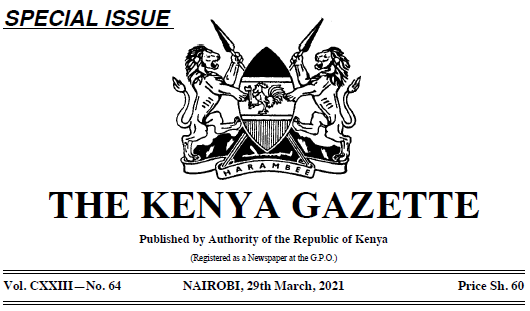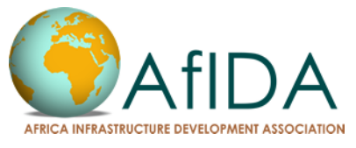PPA Task Force
Published:
Trinity Topics – Kenya’s PPA Task Force
1. What is the PPA Taskforce?
On 29 March 2021, President Kenyatta appointed a Taskforce for the Review of Power Purchase Agreements (the PPA Taskforce), as reported in special Gazette Notice No. 3076.

The PPA Taskforce’s mandate covers, in broad terms, the review and analysis of power purchase agreements (PPAs) entered into by the Kenya Power and Lighting Company (KPLC) and the review of the sustainability and viability of independent power projects (IPPs) and the energy sector in Kenya. A more detailed description of the mandate is set out on the following page.
The fifteen members of the PPA Taskforce are drawn from across the public and private sectors with a broad range of expertise in fields including law, finance and engineering.
John Ngumi (chairman of the Industrial and Commercial Development Corporation) has been appointed as Chair of the PPA Taskforce, with Jasper Mbiuki (Secretary, Legislative Affairs and Regulatory Compliance at the Office of the President), Lillian Abishai (Deputy Chief State Counsel at the Office of the Attorney General & Department of Justice) and Elsie Mworia (Legal Counsel at KPLC) serving as joint secretaries.
The PPA Taskforce will service for an initial period of six months from 29 March 2021, although this term may be extended. Our expectation is that it will be extended given the amount and scope of work purported to be completed in the Gazette Notice, as set out below.
During the tenure of the PPA Taskforce, a moratorium has been placed on:
- All PPAs not concluded as of 29 March 2021, including any related letters of support and legal opinions pending issuance by the Attorney General.
- The renewal of any PPA whose renewal would occur during the pendency of the PPA Taskforce.*
* With the exception of those that shall receive approval by the Board of Directors of KPLC for the purposes of renegotiation but subject, at all times, to ratification by the Cabinet Subcommittee of KPLC.
2. What is the Kenyan PPA Taskforce’s mandate?
| (a) Undertake a comprehensive review and analysis of the terms of all PPAs entered into by KPLC. |
| (b) Probe the compliance of the PPAs and all associated agreements with Government policies, legislation and regulations and identify what appropriate actions should be taken, including the termination or renegotiation of the PPAs. |
| (c) Review the sustainability and viability of all independent power generation projects that have been proposed, are under implementation, or in operation, and make appropriate recommendations. |
| (d) Review the allocation of risk between the independent power producers and KPLC under the PPAs, and make appropriate recommendations. |
| (e) Review the Take-or-Pay approach applied under the PPA structure and recommend a viable Pay-when-Taken (merchant plant) approach, or any other viable payment structure, for use in IPPs. |
| (f) Develop a suitable strategy for engagement with the independent power producers and lenders, in order to achieve relief for electricity consumers and ensure the long-term viability and sustainability of the energy sector |
| g) Review the current methods for sourcing of independent power producers and recommend appropriate alternative sourcing frameworks, including energy auctions. |
| (h) Recommend legislative, regulatory, policy or administrative interventions for the implementation of the recommendations and strategies of the PPA Taskforce |
| (i) Develop a detailed action plan for implementing the recommendations made by the PPA Taskforce. |
| (j) Perform any other function or tasks as the PPA Taskforce may find necessary in order to deliver on its mandate. |
Source: special Gazette Notice No. 3076.
3. What is the context?
Before examining the potential impact of the PPA Taskforce’s work on the private sector, it is worth stepping back and considering the context in which the PPA Taskforce has been constituted.
Kenya continues to suffer from a significant energy over-supply, and consumer tariffs remain high. Coupled with the under-development of the country’s transmission and distribution network (in part responsible for the lower-than-anticipated demand for power and significant technical supply losses), it is clear that there are sector-wide issues that need to be addressed.
That said, in Trinity’s view, the termination or renegotiation of existing PPAs is not necessarily the right way forward. For example, a focus on (i) improvements in the performance of KPLC itself and (ii) transmission and distribution (including, for example establishing a taskforce to look at issues relating to these matters) could have been more productive. The Government of Kenya unquestionably has a responsibility to its citizens to seek sector reforms and ensure long-term sustainability but, having successfully delivered long-term investment by international investors in respect of the IPPs agreed over the past 15+ years, it would be a shame for Kenya to be perceived as having a less attractive investment regime.
In this light, it is hoped that the work of the PPA Taskforce can lead to positive changes for the sector, whilst also preserving Kenya’s reputation as an attractive emerging market investment destination.
4. How might private sector investments be protected?
The establishment of the PPA Taskforce, with its specific mandate to review, analyse and possibly terminate or renegotiate existing PPAs, has led to understandable nervousness amongst the private sector investment community.
When funding and developing IPPs in Kenya, the private sector relies heavily upon the sanctity of the PPAs and other contracts that are signed in order to protect their investments.
Whilst, at the time of writing, the exact direction of travel of the PPA Taskforce remains unclear (key stakeholders and members of the public have been requested to submit their views by way of written memoranda by 28 May 2021), we are hopeful that the experienced and well-respected members of the team will undertake their mandate in the context of the following key considerations:
- Existing PPAs entered into by KPLC should have been through a full regulatory approval process and, in most cases, should also be supported by an enforceability legal opinion, and more recently by approvals from the PPP Unit, as well as through various ministries and the regulator.
- Equally, most IPPs that benefit from a KPLC PPA will also benefit from a Letter of Support from the Government of Kenya, which contains various representations and warranties in respect of the nature and enforceability of KPLC’s obligations and the PPA, and provides certain protections in respect of political risk. The enforceability of this document will likely also be supported by an opinion issued by the Attorney General.
- Any decision to terminate a PPA other than for reason of Seller Default will prima facie lead to termination compensation (amounting, in broad terms, to an amount equal to the debt and equity invested) becoming payable by KPLC.
- Any existing PPA that has been “banked” by the international finance community will contain international arbitration provisions that can be invoked in the case of dispute.
- The risks and potential liabilities (both on an individual IPP and wider investor confidence level) that are likely to arise in the event that the tariffs for existing PPAs are reset should not be under-estimated.
The PPA Taskforce will no doubt remain mindful of these points, and the hope remains that the impact of their work on the private sector will be both considered and pragmatic. Of course, for those IPPs in the early stages of development, the effect of the moratorium could be significant but, if the key stakeholders in the process are able to engage and communicate transparently and work together to seek solutions to the wider issues that the Kenyan power sector is facing, a positive outcome can be achieved.
5. How can you get involved in the private sector response?

As a founding member of the Africa Infrastructure Development Association (AfIDA), Trinity is working with other members of the organisation to coordinate a private sector response to, and communication channel for engagement with, the PPA Taskforce.
AfIDA has already delivered an initial letter to the PPA Taskforce summarising its members’ immediate position, and has also established a number of working groups to consider and address the work of the PPA Taskforce as it seeks to achieve its mandate.
More information on AfIDA can be found at https://afida-africa.org/.
As a firm, we will also monitor the situation closely, advising our clients in respect of the submission of written memoranda to the PPA Taskforce and any engagements with the PPA Taskforce on an individual IPP basis. Updates will be provided through Trinity Topics and other Trinity platforms.
For further information, please contact:

Kaushik Ray
Partner
E: [email protected]
T: +44 (0)20 7997 7045
M: +44(0) 7825 943900

Jo Sykes
Senior Associate
E: [email protected]
T: +44 (0)20 7997 7043
M: +44(0) 7837 063897